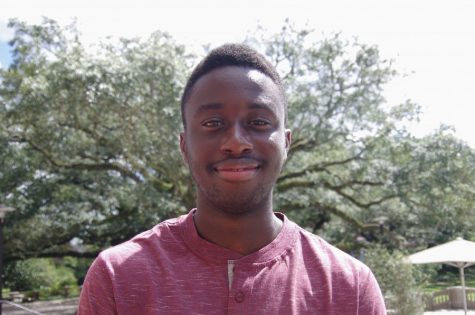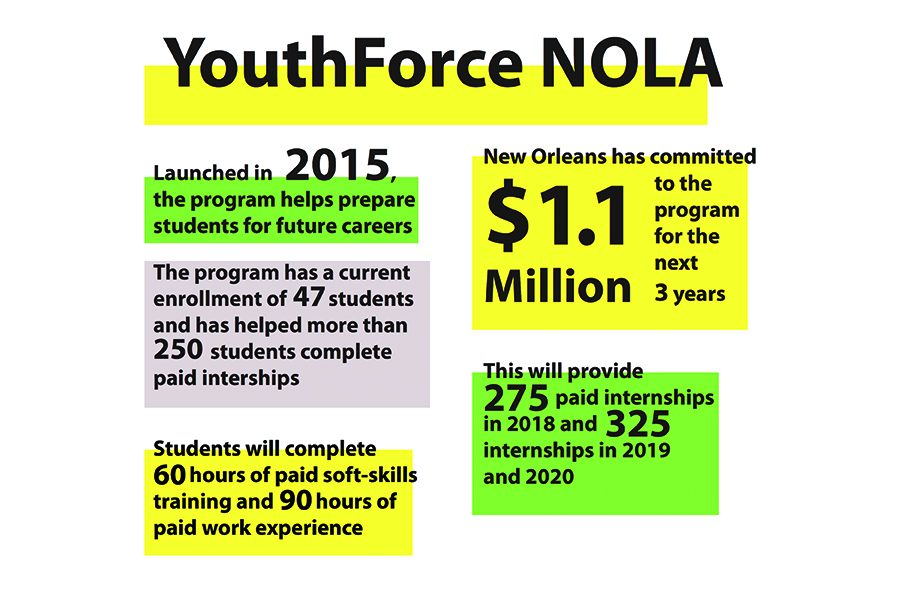City’s agreement with YouthForce NOLA prioritizes student success

Last month, the New Orleans City Council agreed to provide $1.1 million in paid internships for the city’s high school students.
The initiative, undertaken with YouthForce NOLA, aims to support up to 275 interns in 2018, with the number increasing to 325 interns in both 2019 and 2020. This collaboration between the private and public sectors, delivering a good which neither has been able to provision on its own, is a noteworthy achievement, and one which other cities, businesses and educational institutions should emulate.
YouthForce NOLA, which was created in 2015, aims to “remedy … the problem of too few young people being prepared for … jobs that are expected to become available in the New Orleans area in the next decade,” according to The Advocate. With 47 students currently enrolled, one of the program’s goals is for 10 percent of graduating high school students in 2020 to have completed a YouthForce internship. Working with schools to ensure students have the requisite skills for the workforce, the program is currently partnered with 16 public schools in New Orleans. Nonetheless, schools may apply annually for the program, exposing more students to its advantages.
It’s official! Last week, the City committed $1.1M to support #YouthForceInternship student stipends through 2020! Thank you, @MayorLandrieu and @NOLACityCouncil Read more here: https://t.co/kv5wmfZ6cc
— YouthForce NOLA (@YouthForceNOLA) December 19, 2017
Though internships are frequently touted as prime opportunities for students to acquire real-world experience, many are often excluded from receiving these advantages. Too many internships, especially for high school students, are unpaid. As a result, low- and even middle-income students are discouraged from applying, finding the financial burden unfeasible. With the support of organizations from JP MorganChase to the Urban League of Louisiana, as well as the city government’s funding, however, these students can finally obtain valuable experience.
“This partnership is an incredible example of meeting youth where they’re at with a program that attacks inequity head on” – Councilmember-At-Large @RunWithJason pic.twitter.com/MwFaW0eRIi
— NOLACityCouncil (@NOLACityCouncil) December 19, 2017
The program, which had operated for two years prior to its agreement with the city, is an example of how private organizations and city governments can work together to address pressing issues. In recent years, city and state governments have sought out business investment, offering firms millions in tax incentives to locate in their jurisdictions. Though this has been good for businesses, taxpayers have effectively borne the brunt of these policies, particularly if these businesses leave town.
By contrast, the YouthForce NOLA collaborative fuses educational, governmental and philanthropic efforts in pursuit of a collective good. Providing the city’s students with the skills to succeed for tomorrow’s jobs, the city’s $1.1 million agreement with YouthForce is an investment, not an expense.
This example of private and public sector cooperation is one, however, that need not end at high school. Similarly, college students, as they prepare to enter the workforce, face the pressure to gain work experience. Similar initiatives to assist college students that match YouthForce NOLA in ambition should be undertaken. Some may bemoan yet another cry for government funding in education, as is their right.
Nonetheless, supporting students however possible and facilitating their future contributions to the community is the moral responsibility of any society. Or, as we might say at Tulane, these steps must be taken not for one’s self, but for one’s own.
This is an opinion article and does not reflect the views of The Tulane Hullabaloo. Nketiah is a sophomore at Newcomb-Tulane College. He can be reached at [email protected].
Your donation will support the student journalists of Tulane University. Your contribution will allow us to purchase equipment and cover our annual website hosting costs.



Leave a Comment